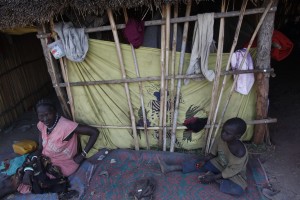
Armed and Ready
It’s odd that I’ve been thinking of Sheriff Bolivar Bishop here in Africa.
We’ve been immersed in refugee matters for the past months. Hundreds of thousands of South Sudanese have been on the move due to fighting within the country between government forces and defected military units.
Recently, a Louisiana group of pastors from my home parish of Beauregard visited in the refugee camps. Another group from Dry Creek is coming in a few weeks.
Our team leader, Bob Calvert, made an insightful statement, “You Louisiana folks know all about what it’s like to be displaced. Through your hurricanes, you’ve learned how to help folks as well as receive assistance.”
Bob’s correct. We know from experience what it’s like.
In SW Louisiana, time is divided between “Before the storm” and “after it.”
We all go back to 2005.
There were two storms. Big sister Katrina as well as her lesser known but equally destructive younger sibling, Rita.
Both hurricanes affected our corner of Louisiana.
Katrina brought in thousands of displaced people, most of them from New Orleans.
We learned a great deal during late August and early September about caring for those displaced. For refugees, or as they were officially called, “IDPs”
That’s “Internally Displaced Persons.”
But it’s hurricane Rita that arrived in late September and flattened our area. When someone in the Lake Charles area says, “Where’d you go for the storm?” they’re
referring to Rita.
We personally learned what it means to be uprooted and travel into exile, even if it’s only a few days or weeks.
We experienced the feeling of being supplied with water (by the National Guard) and food (by the Red Cross and our beloved Louisiana Baptist Disaster Relief friends).
As we’ve been among thousands of South Sudan refugees (we were in Adjumani Camp last week that currently holds 45,000 people.) In the reception camp, there was a Superdome-like mass of humanity desperate for succor.
It all brought me back to 2005.
And that’s when I thought about my Sheriff.
Sheriff Bolivar Bishop.
I’ve lived nearly sixty years in Beauregard Parish and have only had three sheriffs, Paul Stark, Bolivar Bishop, and Ricky Moses.
Bolivar Bishop spanned most of those five-plus decades. To us, he was simply “Sheriff.”
If I recall correctly, he was a banker before taking office as Sheriff. He was a close friend of much of my paternal family and I always enjoyed being around him.
He was quiet and reserved yet had an aura about him that commanded respect.
As an adult, I was fascinated by Sheriff Bishop’s leadership style. He preferred to be behind the scenes and allow his staff and departments to do their jobs.
During September 2005, I attended a daily briefing at the Sheriff’s Office. The meeting was to coordinate the dozens of locations where Katrina evacuees were staying.
Deputy Glen Mears, director of Emergency Preparedness, led each briefing. Sheriff Bishop would say a few words then drift to the back of the room as Mears coordinated relief efforts.
About mid-September, a new agenda item appeared at the briefings. A tropical storm was churning into the Caribbean.
As this storm entered the Gulf, it had a name.
Rita.
Early predictions showed it making landfall far down the Texas coast near the Mexican border.
But each day’s briefing showed Rita making its way up the coast toward us.
The meetings at the Sheriff’s Office shifted to preparation for this storm.
Larger crowds attended and the meetings were longer.
Sheriff Bishop kept his low profile.
I’ll always remember the Emergency Meeting on the day Rita came ashore.
It was a Friday.
A computer model showing Rita’s size and landfall looped on the large screen.
Being a historic event, I took my son Terry (age 16) to the meeting.
I pointed out all of the officials in the room.
“Terry, there’s our Sheriff.”
I did a double-take. “He’s wearing a sidearm.”
I turned to Terry. “This is more serious than I thought. I’ve never seen the Sheriff wearing a gun.”
Southwest Louisiana and Beauregard Parish survived Rita.
Our area was as prepared as could be.
Things weren’t perfect but they went well.
I doubt if Sheriff Bishop ever had to pull his gun.
As a whole, our area got up off the ground, dusted off, and went to work.
We didn’t wait for FEMA or any agency to rescue us.
We started returning home and rebuilding.
All across northern Uganda and South Sudan, we’ve seen what is called “The Katrina Stare.”
Folks who’ve lost everything.
I haven’t seen many sidearms.
The AK-47, slung across the back, is the weapon of choice in this part of the world.
I’m hesistant to compare our hurricanes to the storm of war.
We were out of water for a week, no electricty for nearly two weeks.
 Creekbank Stories Curt Iles, Storyteller
Creekbank Stories Curt Iles, Storyteller
